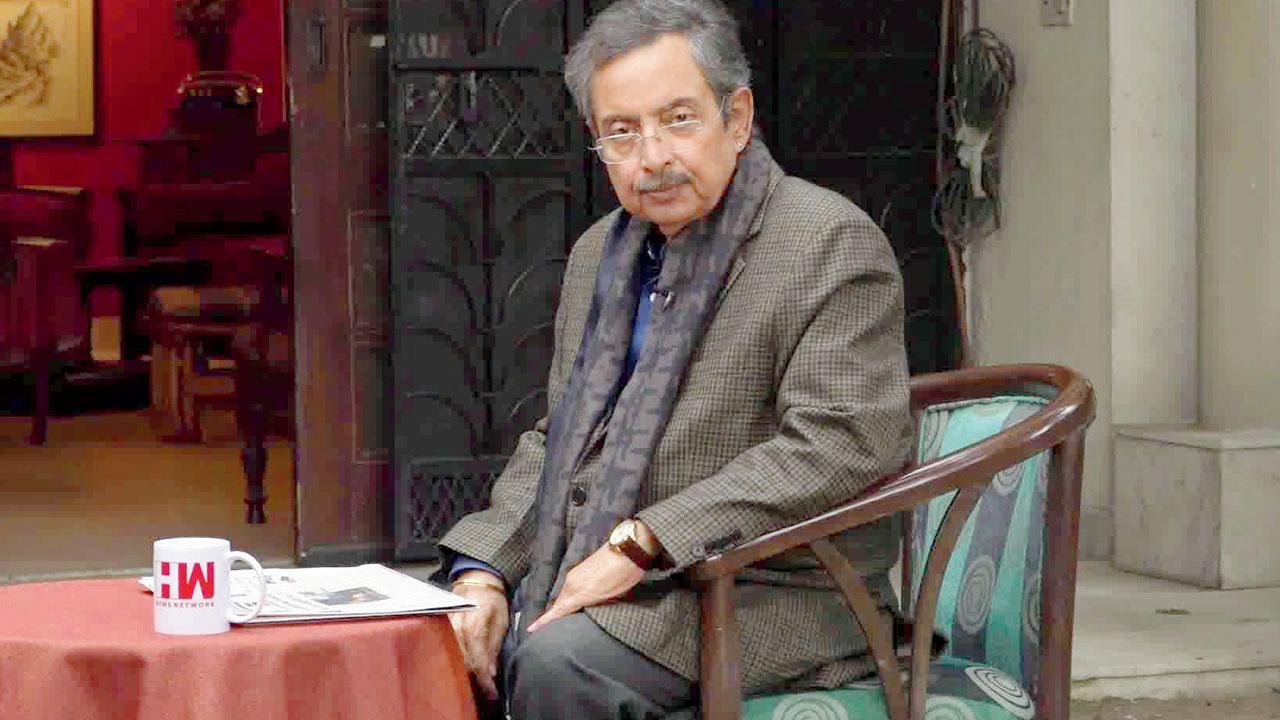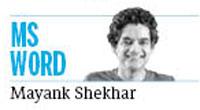What’s it about the untimely demise of a journalist that affects so many at once?

Vinod Dua identified himself as a broadcaster, rather than practising “patrakarita” —a heavy word that wallows more in self-pity or self-importance, than producing much of evergreen worth. Pic/Facebook
 One of the ways to tell an imminent cabinet reshuffle, journalist Vinod Dua told Madhu Trehan in a Newslaundry interview once, is to tap sources within Rashtrapati Bhawan. Meaning, people who organise flowers/podiums/mics/chairs for a function that, while kept under wraps, needs to be planned for in advance nonetheless.
One of the ways to tell an imminent cabinet reshuffle, journalist Vinod Dua told Madhu Trehan in a Newslaundry interview once, is to tap sources within Rashtrapati Bhawan. Meaning, people who organise flowers/podiums/mics/chairs for a function that, while kept under wraps, needs to be planned for in advance nonetheless.
This is how Dua knew of a cabinet reshuffle in 1992, during PM Narasimha Rao’s tenure. Dua also learnt that Sardar Buta Singh was going to be inducted into the new cabinet. Only that neither knew for sure whether Singh would get civil supplies ministry (that he eventually did), or defence.
And so he shot two separate pre-recorded interviews with Singh, as the new minister—of both ministries! Singh, as “defence minister”, promised to raise salaries for Navy and Air Force personnel; that obviously never happened, and the episode never aired!
This is the kinda playfulness that usually animates reporting/journalism—that you need a sense of humour for, that Dua clearly had, to recount it later. Purism is usually for bores; and wouldn’t suit Dua, if you’ve observed his sarcasm + wit on TV over decades—being India’s first Hindi anchor, as against a spoon-fed news reader, on air since November 1974—so far back in time that one’s tempted to believe there wasn’t even TV then.
There was Doordarshan, the only (state-run) channel, where Dua refreshingly grilled ministers from the same government that he owed his job to. Gently still, as a good host should, with a guest, after all. And because politeness shouldn’t be confused with political correctness. Neither does irreverence foreshadow eventual irrelevance.
Last checked, Dua, 67, was a voice of authority on ‘digital’! Consistency being the key.
Surely there was pressure on Dua? He remained a freelancer under professional contract all his life—ducking a direct assault on his freedom of speech from the powerful, and therefore the pressured proprietors. Retaining independence, despite helping launch a series of private TV news channels, and moving on.
He refused to wear a uniform or do ‘Sahara Pranam’ on Subroto Roy’s TV outfit. Had both Pramod Mahajan (BJP) and Kamal Nath (Congress) ask for his head to roll at Zee News. And walked out of Newstrack, precursor to India Today TV, because, apparently, he didn’t like the way the boss, Trehan, spoke to his colleague, which does sound slightly flippant, yes.
Towards the end of his long career, Dua was slapped with that shady colonial law—sedition, which the Supreme Court struck down. Besides, and this is surely unrelated, sexual harassment allegations against him on a Facebook post.
But those aren’t the reasons distant observers over-remember the dead, soon as they’re gone. The hook is often elsewhere. I think Indians of my vintage will remember Dua forever as the silver-tongued, sharply quick Hindi wrap-up translator of Dr Prannoy Roy—decoding elections on TV, nonstop, mid ’80s onwards. Dua was not a psephologist. Roy is.
Uniquely bilingual and giftedly well-rounded, Dua brought a Hindi-speaking India to the same TV screen as the English-speaking elites—the chief spokespersons of whom may possess precious education or drawing room intellect, but never the vocabulary to ever connect with masses of North India.
The masses that regularly make and break governments, presumably based on what they know. It’s not a surprise that the combined earnings of India’s English news channels (based on viewership) has traditionally been less than what radio stations in Mumbai alone draw!
Home-grown, exclusively English medium types can still access Hindi culture. The reverse isn’t always true—fuelling at once an element of self doubt into the latter. Dua brought cerebral swag/confidence to the Hindi journalist. It helped that he identified himself as a broadcaster, rather than practising “patrakarita”—a heavy word that wallows more in self-pity or self-importance, than producing much of evergreen worth.
He had interests—from poetry, theatre to music—that were wider than his obsession with a daily beat. For, what do they know of whatever they cover, be it cricket, politics, or cinema, if that is all they know. He hosted the popular food show, Zaika India Ka, that was about lajawab mohalla restaurants. Rather than avocados/asparagus at posh restaurants of top chefs that only friends/family of an English food writer can access.
In the early ’90s, Dua hosted Chakravyuh, a studio-based programme on public interest issues, what Aamir Khan brilliantly replicated as Satyamev Jayate in 2012. At a point in history where even knowledge is often equated with snobbery, and the counter to it is taking pride in ignorance instead—the one thing trolls could simply never accuse the bright Dua of is being elite, or elitist.
That trite charge wouldn’t stick. He grew up in Delhi’s refugee colonies, went from a government school to read English Honours at Hansraj College, and spent leisurely hours at India International Centre.
At once at ease, he said, with sharing morning tea with his friend who drove an auto rickshaw for a living and evening tea with Dr Roy instead. Sure you could disagree with his views. The danger in a society is when you want those views to disappear into lazy labels first, and altogether thereafter.
To misquote Voltaire, if Vinod Dua did not exist in media’s India, it would be necessary to invent him. Dua does not exist.
Mayank Shekhar attempts to make sense of mass culture. He tweets @mayankw14
Send your feedback to mailbag@mid-day.com
The views expressed in this column are the individual’s and don’t represent those of the paper.
 Subscribe today by clicking the link and stay updated with the latest news!" Click here!
Subscribe today by clicking the link and stay updated with the latest news!" Click here!










